Do I have a deportation order?
If you’ve had immigration problems in the United States, you may wonder if you have a deportation order. Perhaps immigration officials stopped you near the border, but you don’t know if you got a deportation. Or maybe they told you to go to court, but you never did. Or maybe you signed a voluntary departure, but aren’t sure.
Having a bad immigration record can cause problems. It can make you worry if one day you’ll be arrested. Or it can also keep you from fixing your papers.
This article will teach you how to find out if you have an order of removal. First, we explain why it’s important to know if you have a deportation on your record. Next, we discuss what exactly a deportation order is. Then we explain how to find out if you were deported. Finally, we discuss what to do if you have an order of deportation.
Why learn if I have a deportation order?
We discuss here why you should find out if you have a deportation order in the United States.
Reason #1: You don’t want ICE to arrest you.
Let’s suppose you live in the United States. If at some point you were arrested or detained by immigration officials, you have reason to be concerned. When you have a final order of deportation, ICE can arrest you at any time. If you don’t have an order of deportation, you can enjoy some peace of mind.
More importantly, if you know that you have an order of deportation, you can do something about it. You can contact an immigration attorney. Or you can learn how to lift your deportation order. Also, you can ask for something called a “stay of removal.” A stay of removal doesn’t cancel the deportation order. However, it can stop ICE from trying to act on it.
The bottom line: knowing if you got a deportation can help you avoid an unpleasant visit by immigration officials.
Reason #2: To fix your papers
Often a deportation order can prevent you from fixing your papers, getting a green card, and becoming an American citizen.
For example, suppose your son finally turns 21 years old. Although he can file a petition for you, you cannot get a green card through USCIS. If you try, USCIS will tell you that it can’t give you a green card because only the immigration judge has that power.
Or perhaps you marry a United States citizen. That old deportation order will still bar you from applying for a green card.
Reason #3: To travel to your country
Immigrants with deportation orders face are torn between staying in the United States with their families and visiting their sick and dying relatives back home. This is tragic. To travel freely, you need to know if you got a deportation order , who gave it, and how to cancel it.
Reason #4: To know what actually happened in court or at the border
The immigration laws are confusing. And if you don’t know exactly what happened when you interacted with immigration officials, you’re not alone. Did I get a voluntary departure? Did I “sign”? Was a decision made in my case?
When someone sees an immigration official, many things can happen. Learning whether you received a deportation order is the first step to getting answers.
Reason #5: To find out if and when you can return to the United States
Let’s say you are outside the United States. At some point, U.S. immigration officials sent you back to your home country. Naturally, you will ask, “Can I return? When?” To know if you can come back, and when, you need to find out if you have an order of deportation. You also have to know what type of deportation you have.
Usually, if you left the U.S. after getting a deportation order, you have to wait outside the U.S. for 5 or 10 years. (Whether it’s 5 or 10 will depend on the type of deportation.)
Even if you didn’t get a deportation order, you can still face a punishment, like a 10-year bar for illegal reentry.
How can I know if I have a deportation order?
What can you do to verify if you have a deportation?
Step 1: Begin by checking the immigration court system
This is the easiest way to start. It’s fast, simple, and online. But remember: even if you don’t find a deportation order in the court system, that doesn’t mean that you don’t have one! In other words, you may have a deportation — just not one from an immigration judge.
In any case, start by checking the court system. Here’s how:
Go here. Our page will explain how to get to check your court date.

Plug in your Alien Number!
But to check the court system, you have to locate your 9-digit alien number, which you can find on various immigration documents.
Here are some places to look:
Check your Notice to Appear
The Notice to Appear (NTA) is paper that states why the government wants to deport you, and tells you to go to immigration court. The alien number is on the top-right corner of the page.
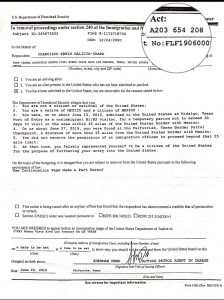
Check hearing notices
Your alien number is also on the hearing notice from the immigration court.
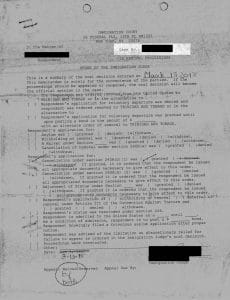
Check receipt notices
If you apply for an immigration benefit, the government sends a notice confirming that it got the application. It’s called a receipt notice. It sometimes has an alien number.
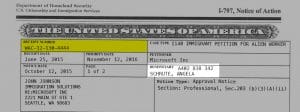
Check decision letters
If the U.S. government denies your application, it send you decision letter. It will also include an alien number:
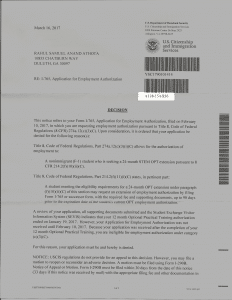
What if I can’t find my alien number?
If you cannot find an alien number, don’t worry. Later, we explain what to do if you either can’t find your alien number, or if you nothing comes up with the immigration court system. There are other ways to find out if you have an order of deportation on your record.
What happens after I enter my alien number in the online immigration court system?
Assuming you have found your alien number, and you have entered it online, you can now check if you have a deportation order.
If you have a deportation order, the system will tell you that you that the immigration judge “ordered removal.”
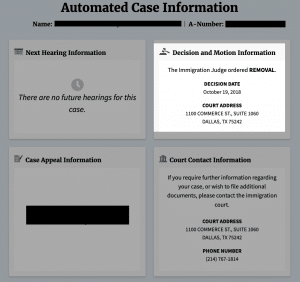
What if I’m not in the online immigration court system?
If you’re not found in the system, the website will return this result:
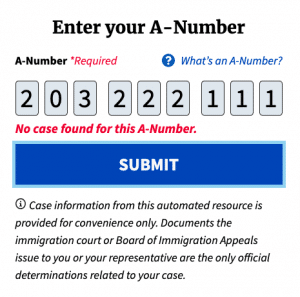
This tells you two things:
- You never had a case in immigration court.
- An immigration judge never gave you a deportation order.
However, this doesn’t mean that you don’t have a deportation order. It just means that a court never gave you a deportation!
Next, we explain how to search for a deportation order outside of the immigration court system.
Step 2: Submit a Freedom of Information Act Request
The next step is to order a copy of your immigration records. You can do this by making a FOIA request. One might ask, “Why should I ask for my immigration court records if nothing showed up in the court system?
The answer: an immigration court is not the only agency that can give you a deportation order! You can get a deportation order from Customs and Border Protection (CBP). (The border agency used be called Border Patrol.) If at any point you came here illegally and were caught, you have may received a deportation order.
Thus, you will want to check your immigration records to find out if a border officer gave you a deportation order.
How do I get my immigration records?
At this step, you may need an experienced immigration lawyer. But you have to make sure that the immigration lawyer does a thorough job in making FOIA requests.
Usually, you need to make more than one FOIA request. A record of your deportation order may not show up in one agency’s records, but may appear in another. In other words, there is not one immigration file — there are many. Each agency has different immigration files.
We recommend asking the following agencies for your records:
- OBIM, or Office of Biometric Identity Management.
- CBP, or Customs and Border Protection. Some call this agency, “Border Patrol.”
- FBI, or Federal Bureau of Investigation.
- EOIR. This is the immigration court system.
- ICE, or Immigration and Customs Enforcement.
Asking OBIM and the FBI for records is a great option: these two agencies will search their records using your fingerprints. And this makes it easier to find your records.
Once I get my immigration records, how will I know if I have a deportation order?
Let’s say you ask CBP (or Border Patrol) for your records. How will you know if you have a deportation order?
Sometimes the response from CBP will have a document that says “expedited removal” at the bottom:
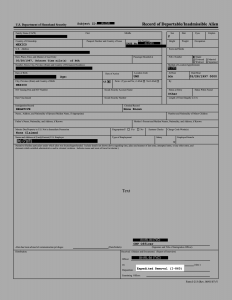
The FBI response may also say whether you have an order of removal. It will look like this:
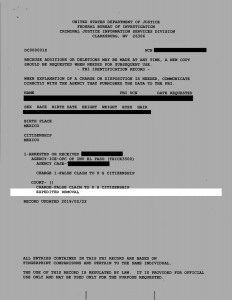
If you asked the immigration court for your records, a removal order often looks like this:
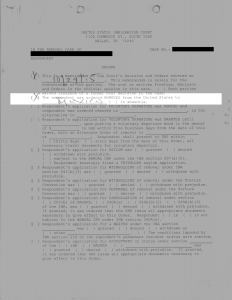
If you have a deportation order, the paper will have an “X” marked in the box next to the line, “Respondent was ordered REMOVED.”
These are just a few examples of what your record looks like if you have a deportation order. It’s best to have an experienced immigration attorney review your immigration records to tell you if you have deportation.
What can I do if I have a deportation order?
In conclusion, if you find out you have an order of deportation, you still have some options. While getting the help of an experience immigration lawyer is important, you can start by learning more about the the possibilities.
First, you should read about how to cancel a deportation order.
Second, if you’re outside the United States, learn whether you can come back legally.



